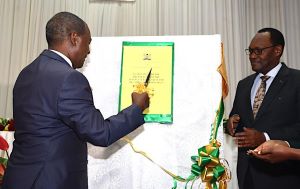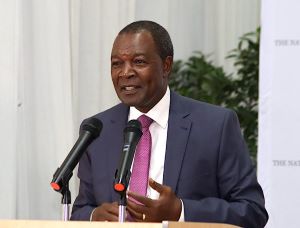Medium-Term Budget Preparation Process at Kenya School of Monetary Studies
The National Treasury and Economic Planning Cabinet Secretary, Prof. Njuguna Ndung’u officially launched the FY2024/25 and the medium-term Budget Preparation Process on 18/8/23 at the Kenya School of Monetary Studies.
The Budget Making Process is anchored in the Constitution of Kenya, 2010, and the Public Finance Management Act. Article 220 of the Constitution and Sections 35(e) and 36 of the Public Finance Management Act, 2012, requires this process to commence not later than 30th August of the preceding financial year.
It is against this backdrop that the National Treasury and Economic Planning issued a Circular outlining the guidelines to be followed by all National Government entities on the budget making process.
Prof. Ndung’u said that it is through this process that the government prioritizes and puts into action its plans, programmes, and policies as may be dictated by prevailing economic realities.
The FY2024/25 and the Medium-Term Budget is being formulated against an improving economic outlook but the international environment is still constrained. According to the latest forecast, Global GDP growth in 2023 and 2024 is projected to decline from 3.5 percent in 2022 to 3.0 percent.
The CS said that the Kenyan economy is expected to remain resilient in 2023 and grow by 5.5 percent and maintain that momentum over the medium-term. Given the limited resources that the economy is likely to generate under the prevailing circumstances, MDAs are expected to critically review, evaluate and prioritize the planned activities and accommodate the corresponding programmes within the available resources.
“The FY2024/25 and the Medium-Term Budget will focus on the implementation of the Bottom-up Economic Transformation Agenda (BETA) which is geared towards economic turnaround and inclusive growth and aims to increase investments in at least five sectors with high potential impact on the economy as well as household welfare. The sectors include: Agricultural Transformation; Micro, Small and Medium Enterprise (MSME); Housing and Settlement; Healthcare; and Digital Superhighway and Creative Industry.” Stated Prof. Ndungú
In preparing the FY 2024/25 and the Medium-Term Budget, MDAs will be required to prioritize allocations towards the achievement of the BETA priorities.
In addition, the FY 2024/25 and the Medium-Term Budget will also be based on the Vision 2030 Fourth Medium Term Plan and build on the progress made in the previous financial years. The Government will continue to address the policy, legal, regulatory, and governance issues as a matter of priority to ensure optimal use of resources in execution of the planned interventions.
Furthermore, the BETA priorities should be mainstreamed into the regular programmes of Ministries, Departments and Agencies. The planning, and budgeting should therefore continue to embrace the value chain approach to budgeting.
The objective of the Kenya Kwanza Government is to vigorously pursue a fiscal consolidation policy that will signal debt sustainability and manageable fiscal gap. The fiscal deficit before the Kenya Kwanza Administration was 6.2 percent of GDP. It has reduced this to 5.3 percent of GDP, by June 2023, and intend to lower it further to 4.4 percent by June 2024.
During the programme prioritization and resources allocation process, the Sector Working Groups are expected to consider and apply the following criteria: Programmes that enhance value chain and linkage to BETA priorities; Implementation of Cabinet Decisions; Linkage of the programme with the priorities of Medium-Term Plan IV of the Vision 2030 Completion of ongoing projects, viable stalled projects and payment of verified pending bills; Degree to which a programme addresses job creation and poverty reduction; Degree to which a programme addresses the core mandate of the MDAs; Programmes that support mitigation and adaptation of climate change; Cost effectiveness, efficiency and sustainability of the programme; and Requirements for furtherance and implementation of the Constitution.
Sector Working Groups will therefore be required to identify and engage stakeholders to obtain their input during the budget preparation process.
The output of the Sector Working Group process will be an important input into the 2024 Budget Policy Statement (BPS), which will provide the framework for finalizing the FY 2024/25 and the Medium-Term period.
As outlined in the Public Finance Management Act, 2012 and its attendant regulations, the budget process involves timely preparation of key policy documents for approval by Cabinet and Parliament.
To facilitate finalization and approval of the policy documents and Bills within the stipulated timeframes, Accounting Officers are required to strictly follow the schedule of activities outlined in the Budget Calendar as set out in the Treasury Circular No.8 of 2023.
Present during the launch were the Chairperson of the National Assembly Budget Appropriations Select Committee, Hon. Ndindi Nyoro, National Treasury, Principal Secretary, Dr. Chris Kiptoo and Economic Planning Principal Secretary James Muhati among others.







